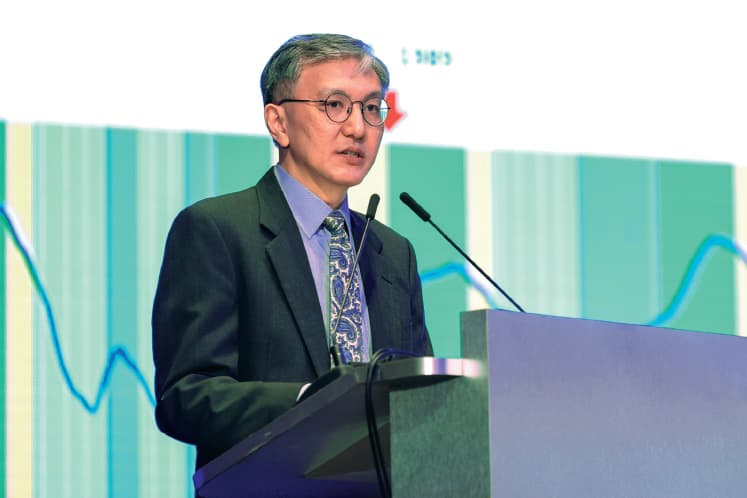
This article first appeared in Personal Wealth, The Edge Malaysia Weekly on January 20, 2020 - January 26, 2020
Equities, Singaporean real estate investment trusts (REITs), Asian credit and gold are expected to do well this year, according to Reginald Tan, head of multi-asset products for Southeast Asia at Schroders Investment Management.
During his presentation, “Top Predictions for 2020”, at The Edge-RHB Premier Investment Insights Dinner, Tan said that even though the MSCI World Index was up 27% (in US dollar terms) in 2019 and is slightly up this year, investors can still expect modest gains in equities.
He added that with the reversal of the 2018 derating and the expectation of a corporate earnings growth of 10% globally in 2020, investors could make money. “There is still potential for gains in the markets this year,
although returns may not be as strong as in 2019, especially when economic growth has stabilised with the US-China trade truce and liquidity remains abundant.”
Tan said he favoured stocks on the Nasdaq because of the inevitable increase in the use of technology. “Data centres are being built all over the world. We know that the adoption of 5G by telcos is coming as well. That is a lot of spending on technology, and it is not going to stop,” he added.
“Earnings on the Nasdaq have been rising strongly since 2001. The S&P 500 has been rising, but not as strong. The premium of the Nasdaq, meaning how expensive it is relative to the broader US market, has come down.
“I won’t say the Nasdaq is cheaper than the S&P 500, but the earnings growth is far better. For example, I can tell you that the Nasdaq has an average price-earnings ratio (PER) of 25 times this year while that of the S&P 500 is 19 times. The Nasdaq is more expensive, but earnings growth is 37% this year for the Nasdaq and 17% for the S&P 500. So, we are willing to pay for that growth.”
Tan said Schroders favoured emerging markets and Asia-Pacific ex-Japan equities due to their earnings and valuations. Their PERs are lower than in global markets and cheaper than in the US. Meanwhile, earnings growth is higher than in developed markets.
“When you have better [corporate] earnings and cheaper valuations, I think that warrants a buy. Even from a price-to-book valuation perspective, you would see that Asia looks much cheaper than the rest of the world,” said Tan.
He said he also liked Singaporean REITs as he believed it would continue to look attractive in a low-yield environment. “Looking at the REITs’ yield spread above the 10-year Singapore Government Securities, the yield in Singapore is a little over 5%. That looks very good from our perspective as it is better than the REITs in Australia, Japan, Hong Kong and so on.”
Asian credits are another area investors should look into because companies in the region are doing well, its economies are stable and improving and the US-China trade war is stabilising, said Tan.
He added that in a low interest rate environment, with expected rate cuts by global central banks, investors tend to look for income certainty and dividends. He pointed out that Asian investment-grade bond yields were higher than those in the US and Europe.
“From our perspective, Asian corporations are doing very well and you can see that their profits have improved since bottoming out in 2012 or so. Profitability is improving and stands at a good earnings before interest, tax, depreciation and amortisation (Ebitda) margin of 15.5%,” he said.
“Meanwhile, corporate leverage has come down. In fact, it is even lower than in the US and Europe. Corporate leverage means the borrowings of a company. So, the lower the better.”
Tan believes that global economic growth will be stable and will see a GDP growth of 2.6% in 2020 and 2021. According to the firm’s baseline scenario, there is little likelihood of a recession over the next year or two, inflation will remain low and there should be reasonable liquidity in the markets.
In the event markets perform better than expected and generate higher returns, investors should look at US small-cap stocks, said Tan. “The US small-cap, or Russell 2000, index has underperformed relative to the S&P 500 when yields are coming down and growth is getting worse. But when yields go up and you expect growth to improve, that is when the Russell index will do much better.”
If a recession happens, gold will act as a hedge and safe haven for investors who want to mitigate risk, he said. “Gold benefits when there is weak growth and no real yield, but has increased liquidity when there is increased political tension. So, it is a hedge against growth. We think this is something to consider when you feel there is a risk of something happening.
“We invested in gold in the last quarter or so and it came in handy in the last two weeks because gold prices shot up after [US President Donald] Trump decided to launch a drone strike that killed Iran’s top commander.”
Save by subscribing to us for your print and/or digital copy.
P/S: The Edge is also available on Apple's AppStore and Androids' Google Play.